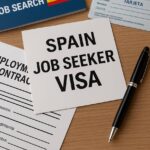Applying for permanent residency (PR) is a major step toward establishing long-term stability in a new country. Whether you’re pursuing PR through employment, family sponsorship, investment, or humanitarian grounds, the process often involves extensive paperwork, eligibility checks, and strict timelines. A small mistake can delay your application or worse, lead to a rejection or ban.
Here are the top mistakes to avoid when applying for permanent residency, regardless of the country you’re applying to.
1. Submitting Incomplete or Incorrect Forms
One of the most common reasons for PR application delays or rejections is incomplete or inaccurate documentation. Missing signatures, outdated forms, incorrect answers, or failure to attach required documents can result in your application being returned or refused.
Tip: Carefully follow the official checklist, double-check every section, and ensure you’re using the latest version of the forms provided by the immigration authority.
2. Failing to Meet Basic Eligibility Requirements
Some applicants rush into the process without verifying if they actually qualify under the selected PR program. Each immigration pathway whether family-based, economic, or humanitarian has specific criteria related to income, employment, education, language skills, or relationship status.
Tip: Carefully review all program requirements before applying. If you’re unsure, consider a professional immigration consultant or lawyer.
If you need more explanation or more information, you can book a consultation and speak to Happy Face
3. Providing Insufficient Evidence
Immigration officers assess the credibility of your application based on supporting documents. Lack of proof for income, work experience, or the genuineness of a relationship (in the case of spousal sponsorship) can raise red flags.
Tip: Provide detailed, well-organized evidence such as contracts, tax returns, bank statements, photographs, communication logs, and letters of support.
4. Missing Deadlines or Not Responding to Requests
If immigration authorities request additional documents or clarification, failure to respond within the given timeframe can result in the automatic refusal of your application.
Tip: Monitor your email and immigration portal regularly, and respond promptly to all communications.
5. Not Disclosing Past Immigration or Criminal Issues
Omitting information about visa overstays, deportations, arrests, or previous application refusals can be considered misrepresentation. This can lead to bans from reapplying or even criminal charges in some countries.
Tip: Always disclose truthfully. If you have a problematic history, consult with an immigration lawyer to assess your options and whether a waiver is possible.
If you need more explanation or more information, you can book a consultation and speak to Happy Face
6. Overlooking Language or Medical Requirements
Many countries require applicants to meet minimum language proficiency levels (e.g., IELTS, CELPIP) or pass medical exams. Failing to meet or document these requirements correctly can lead to processing delays or ineligibility.
Tip: Schedule tests and medical exams early in the process and keep track of their expiry dates—some results are only valid for a limited time.
7. Assuming All Countries Have the Same Process
Each country has its own PR system, with unique documentation, timelines, legal definitions, and processing methods. What works in Canada may not apply in Australia, the U.K., or the U.S.
Tip: Refer only to official government websites or licensed immigration professionals for guidance specific to your destination country.
If you need more explanation or more information, you can book a consultation and speak to Happy Face
8. Not Keeping Copies of Your Application
Many applicants fail to keep digital or hard copies of what they’ve submitted, making it difficult to track details, prepare for interviews, or respond to future correspondence.
Tip: Save a complete copy of your application, including attachments and payment receipts, for future reference.
9. Applying Under the Wrong Category
Trying to qualify under a category you don’t clearly fit—such as applying for a skilled worker program without meeting experience requirements—can lead to wasted time and money.
Tip: Take eligibility assessments or consult a trusted immigration advisor before deciding which pathway to pursue.
10. Relying on Unofficial or Outdated Advice
Online forums, social media groups, or friends who “got PR years ago” might offer well-meaning advice—but immigration laws change frequently.
Tip: Use only up-to-date resources from the official immigration authority. Laws that applied last year may no longer be relevant today.
If you need more explanation or more information, you can book a consultation and speak to Happy Face








